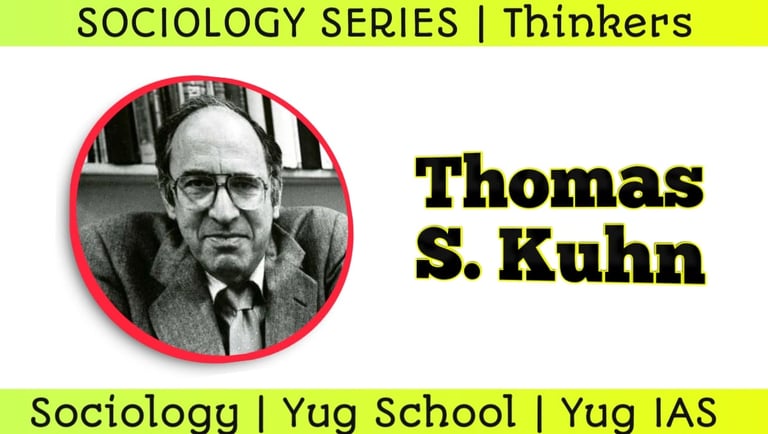Thomas S Kuhn - Revolutionary Thinker in the Sociology of Science
Thomas S. Kuhn was a visionary thinker who transformed our understanding of scientific progress. His concept of paradigm shifts challenged the traditional view of science as a linear..
SOCIOLOGYTHINKERS
Introduction
Thomas S. Kuhn (1922-1996) was an American physicist, historian, and philosopher of science whose work has had a profound impact on the sociology of science, the philosophy of science, and our understanding of how scientific knowledge progresses. Kuhn’s most famous work, The Structure of Scientific Revolutions (1962), revolutionized the way we think about scientific progress, challenging the traditional view of science as a linear, cumulative process. Instead, Kuhn introduced the concept of "paradigm shifts," which describe how scientific disciplines undergo radical transformations in their fundamental assumptions, methods, and worldviews. This blog will explore Kuhn’s life, his major publications, his contributions to sociology, and the criticisms his work has faced.
Thomas Kuhn’s Life and Intellectual Journey
Thomas Samuel Kuhn was born on July 18, 1922, in Cincinnati, Ohio. He initially pursued a degree in physics at Harvard University, earning his bachelor’s degree in 1943, his master’s in 1946, and his Ph.D. in 1949. During his time at Harvard, Kuhn’s interests began to shift from physics to the history and philosophy of science, partly due to his involvement in teaching a course on the history of science for humanities students. This experience exposed him to the complexities of scientific development and the social and cultural factors that influence it.
Kuhn’s academic career took him to several prestigious institutions, including the University of California, Berkeley, Princeton University, and the Massachusetts Institute of Technology (MIT). Throughout his career, Kuhn sought to understand how scientific knowledge evolves and how scientific communities operate. His interdisciplinary approach, blending history, philosophy, and sociology, made him a unique and influential figure in the study of science.
The Structure of Scientific Revolutions: A Paradigm Shift in Thinking
Kuhn’s most influential work, The Structure of Scientific Revolutions, was published in 1962 and remains a cornerstone in the philosophy and sociology of science. In this book, Kuhn introduced several key concepts that have since become central to discussions about scientific progress:
Paradigms: Kuhn defined a paradigm as a set of practices, theories, and assumptions that define a scientific discipline at a given time. Paradigms provide scientists with a framework for understanding the world and guide their research. Examples of paradigms include Newtonian mechanics in physics and the germ theory of disease in biology.
Normal Science: Within a paradigm, scientists engage in "normal science," which involves solving puzzles and refining existing theories. Normal science is characterized by consensus and stability, as scientists work within the established framework.
Anomalies and Crises: Over time, anomalies—observations or results that cannot be explained by the current paradigm—accumulate. When these anomalies become too significant to ignore, the scientific community enters a state of crisis.
Scientific Revolutions: Crises lead to scientific revolutions, during which the existing paradigm is replaced by a new one. This process, known as a "paradigm shift," involves a radical transformation in how scientists understand their field. Examples of paradigm shifts include the transition from Newtonian mechanics to Einstein’s theory of relativity and the shift from the geocentric to the heliocentric model of the solar system.
Kuhn’s ideas challenged the traditional view of science as a steady accumulation of knowledge. Instead, he argued that scientific progress is often discontinuous and revolutionary, with periods of stability punctuated by dramatic shifts in thinking.
Kuhn’s Other Major Publications
While The Structure of Scientific Revolutions is Kuhn’s most famous work, he authored several other important publications that further developed his ideas:
The Copernican Revolution: Planetary Astronomy in the Development of Western Thought (1957): In this book, Kuhn examined the shift from the geocentric to the heliocentric model of the solar system. He analyzed how this paradigm shift was influenced by social, cultural, and intellectual factors, highlighting the interconnectedness of science and society.
The Essential Tension: Selected Studies in Scientific Tradition and Change (1977): This collection of essays explored the tension between tradition and innovation in science. Kuhn argued that scientific progress depends on a balance between conservative adherence to established paradigms and the willingness to challenge and revise them.
Black-Body Theory and the Quantum Discontinuity, 1894-1912 (1978): In this work, Kuhn delved into the history of quantum mechanics, examining how the concept of discontinuity emerged in physics. He emphasized the role of historical context in shaping scientific theories.
Kuhn’s Contributions to Sociology
Kuhn’s work has had a significant impact on the sociology of science, a field that examines how social factors influence scientific knowledge and practice. His ideas have inspired sociologists to explore the following themes:
The Social Construction of Scientific Knowledge: Kuhn’s concept of paradigms highlights how scientific knowledge is shaped by the shared beliefs and practices of scientific communities. This perspective aligns with the sociological view that knowledge is socially constructed and influenced by cultural, political, and institutional factors.
Scientific Communities and Consensus: Kuhn emphasized the importance of consensus within scientific communities. Sociologists have built on this idea to study how scientific consensus is achieved, maintained, and challenged. They have also examined the role of power, authority, and social networks in shaping scientific knowledge.
The Role of Anomalies and Controversies: Kuhn’s focus on anomalies and crises has inspired sociologists to study how scientific controversies arise and are resolved. This research has shed light on the dynamics of scientific change and the factors that influence the acceptance or rejection of new ideas.
The Sociology of Scientific Revolutions: Kuhn’s theory of paradigm shifts has provided a framework for understanding how scientific disciplines undergo radical transformations. Sociologists have used this framework to analyze historical and contemporary examples of scientific revolutions, exploring the social and cultural factors that drive these changes.
Criticisms of Kuhn’s Work
Despite its profound influence, Kuhn’s work has faced several criticisms:
Relativism: Some critics argue that Kuhn’s emphasis on paradigms and paradigm shifts leads to relativism, the idea that scientific knowledge is subjective and dependent on the prevailing paradigm. Critics worry that this undermines the objectivity and rationality of science.
Incommensurability: Kuhn’s claim that paradigms are "incommensurable"—meaning they cannot be directly compared—has been criticized for making it difficult to evaluate the progress of science. Critics argue that this view overlooks the ways in which scientific theories can be compared and assessed.
Neglect of Individual Agency: Some sociologists have criticized Kuhn for focusing too much on the collective nature of scientific communities and not enough on the role of individual scientists in driving scientific change.
Overemphasis on Revolutions: Critics have also argued that Kuhn’s focus on scientific revolutions overlooks the importance of incremental progress and the gradual refinement of scientific knowledge.
Kuhn’s Legacy in Sociology and Beyond
Thomas Kuhn’s work has left an indelible mark on the sociology of science and our understanding of scientific progress. His ideas have inspired generations of scholars to explore the social, cultural, and historical dimensions of science. Kuhn’s emphasis on paradigms, scientific communities, and revolutions has provided a powerful framework for analyzing how scientific knowledge is produced, validated, and transformed.
Beyond sociology, Kuhn’s influence extends to fields such as philosophy, history, education, and even popular culture. The term "paradigm shift" has entered the mainstream lexicon, often used to describe radical changes in thinking across various domains.
Thomas S. Kuhn was a visionary thinker whose work challenged conventional views of science and opened up new avenues for understanding the social and cultural dimensions of scientific knowledge. While his ideas have faced criticism, they continue to inspire and provoke debate, underscoring their enduring relevance. As we grapple with complex scientific and societal challenges, Kuhn’s insights remind us of the dynamic and evolving nature of knowledge and the importance of questioning established paradigms. In the words of Kuhn himself, "The historian of science may be tempted to exclaim that when paradigms change, the world itself changes with them."


Thomas S. Kuhn: Revolutionary Thinker in the Sociology of Science
Sociology| Sociology|Sociology
